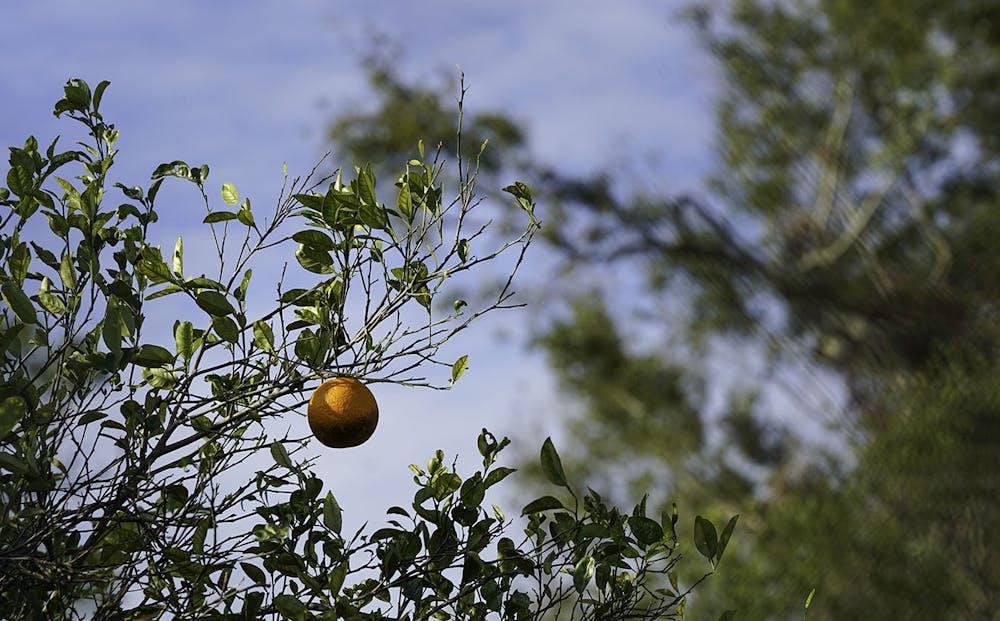Correction: This story has been updated to reflect that the disease black pod rot is not caused by a fungus. The article previously incorrectly reported that it was a fungal disease.
The breakfast crowd at the Waffle House on West Newberry Road was in for a rude awakening in early February. All meals with fluffy scrambled eggs and puffy omelets cost them extra.
Waffle House chains nationwide added a 50-cent surcharge to dishes with eggs beginning Feb. 3. Some diners were indifferent, others resentful.
Supply chain issues have recently disrupted the global food system, a similar phenomenon to that seen during the COVID-19 pandemic.
Traditional breakfast fare like eggs, orange juice, coffee — and even the sweet morsels in chocolate chip pancakes — were not spared.
The curse of “eggflation”
Yolks are the new liquid gold, and finding affordable eggs just got harder. Avian Influenza, also known as the bird flu, has ravaged the U.S. eggs and poultry industry since 2022 and has intensified in the past few months, according to the Centers for Disease Control and Prevention. The H5N1 virus, which causes the disease, spreads through contact with infected birds or their feces.
While cases of bird flu in humans are rare and have been scattered across the U.S., the CDC said it’s actively tracking the disease.
When he’s not teaching, Kevin Folta helps manage Eggsotics, a family egg farm in Archer. The UF horticultural science professor said his flock has avoided bird flu thus far, but he’s not counting out the possibility of infection.
If one of his birds gets sick, he’ll have to euthanize the rest, which Folta said would be devastating for Eggsotics.
“It would cost thousands of dollars to replace our current flock,” he said. “Plus, we would lose tens of thousands in production from meat birds, eggs and Thanksgiving turkeys in 2025.”
Since its detection in U.S. poultry stock three years ago, bird flu has forced farmers to cull millions of infected chickens and ducks. Fewer birds mean fewer eggs — and higher prices for consumers.
Some grocery store chains have limited the number of eggs customers can buy to prevent running out of cartons. While shoppers pay between $4 and $5 for a dozen white large-shell eggs, grocers fork over an average wholesale price of $7.34 — more than triple what they did 2024 — and sell at a loss, according to USDA data. Eggsotics has not changed its prices, which Folta said would be unethical amid a national shortage.
While experts struggle to contain bird flu, Folta said small farms filling the egg void should take extra precautions. He and his wife plan to move their free-ranging outdoor chickens into mobile coops to isolate them from migratory birds carrying the virus.
“It is likely to be moving and something we need to be on strict surveillance for,” he said.
Citrus farmers, consumers feel squeezed
Along with scrambled eggs, breakfast beverages aren’t getting any cheaper. Florida’s orange juice industry is in peril, said former Gulf Citrus Growers Association president Ron Hamel.
Citrus greening, a bacterial disease, has been tearing through Florida groves since 2005. Greening, transmitted from Asian citrus psyllid insects to orange trees, has shriveled the state’s citrus yields to a fraction of what they were in the 1990s.
“There's very, very few people that think the industry will be what it was in its heyday,” Hamel said.
Citrus growers measure output in “boxes,” which are 90-pound fruit crates. At their peak in 1998, Florida farmers filled nearly 250 million boxes of oranges. This year, they’re likely to fill 13 million, said Raymond Royce, executive director of Highlands County Citrus Growers Association.
Aggressive hurricanes and citrus greening have damaged millions of acres of Florida orange groves in the past few years. UF agricultural researchers previously reported Florida had more than 800,000 acres of citrus-bearing trees in the 1990s. Royce doubts even a quarter of those productive groves remain.
There is no cure for citrus greening, but farmers can manage its spread. UF researchers are developing greening-tolerant citrus varieties and genetically modified trees. They’re also experimenting with bactericide injections, a temporary salve.
“What we’re trying to do out there is maintain some level of productivity so that we can all stay in business and still provide some orange juice as we look for these longer-term solutions,”
said Chris Oswalt, a citrus agent with the UF Institute of Food and Agricultural Sciences.
Extra production expenses have trickled down to consumers. Since 2019, the price of orange juice concentrate has climbed more than 80%, from about $2.40 to $4.50.
Even those in the business can’t stomach the cost. Tracey Hobbs, a UF agricultural assistant in citrus production who works with growers in Polk County, said she’s given up orange juice to accommodate her grocery budget.
“I don't buy any now because it’s not a necessity,” she said. “It was a splurge, and I can't afford to buy it.”
Cocoa in the crossfire
Hershey bars and Almond Joys won’t emerge from the supply chain unscathed, either. The price of chocolate sold in the U.S. increased three times the rate of inflation in 2023. That’s because cacao, the raw form of the cocoa bean and the key ingredient in chocolate, is facing an environmental crisis.
Recent bouts of bad weather in West Africa, where about 70% of the world’s cacao is grown, have substantially curbed yields. Analysts projected cacao-growing regions would be out of the woods after a devastating 2024 season, but this year’s outlook is grim. Farmers are battling droughts and the spread of plant diseases.
UF plant pathologists have partnered with the Mars confectionery company to combat black pod rot, a disease that has plagued cacao trees for almost 50 years. It can destroy up to 30% of global cacao pods annually.
Mariana Herrera Corzo, a UF plant pathology graduate student working on the project, said the hallmarks of black pod rot are dark spots and fluffy white fungus-like growths.
The research aims to determine which cacao plants can resist the disease and then use the results to help farmers in Africa develop sustainable cultivation strategies.
With funding from Mars, the team receives cacao pods shipped from Costa Rica and injects them with disease-causing pathogens to guard against future infection. They’re also breeding the pods to boost genetic resistance.
“We have some clones that could be less susceptible, and the idea is to provide this information to the breeders,” Herrera Corzo said.
Americans rely on other countries for both the raw materials used in chocolate production and the finished product. The U.S. imports the most chocolate worldwide — more than $4 billion worth in 2023, much of which came from Canada.
Chocolate from Canada may become more expensive in March when the Trump administration’s 25% tariffs on Canada and Mexico take hold. Almost immediately upon implementation, tariffs will raise prices on imports like chocolate.
Brace for pricier lattes
Coffee may jolt consumers long before finding its way into cappuccinos. The price of a pound of store-bought ground roast soared from less than $5 in 2020 to an all-time high of just over $7 in January, the U.S. Labor Department reported last month.
About 70% of U.S. coffee imports come from Brazil, Colombia and Vietnam, where growing conditions are optimal. But droughts and floods in the major coffee-exporting countries have curtailed production. As global demand surges, wholesale prices have skyrocketed.
That doesn’t mean the cost of a take-out coffee will suddenly jump, as corporations like Keurig and Starbucks order beans at a market price determined years in advance.
“You’re not gonna see a $3 to $5 rise in the price of coffee [in] this higher market, but you are gonna see probably more lower-quality coffee included in blends because it’s cheaper,” said University of South Florida graduate student Victoria Brown, who’s studying ecological issues in coffee production.

The threat of steeper tariffs on imports has also rocked the market. Late last month, President Donald Trump vowed to slap a 25% tariff on Colombia amid an immigration dispute, driving up wholesale coffee prices. The measure never took effect, but a pound of coffee beans grown in Latin America now costs a record-shattering $3 to $4.
The U.S. cannot produce enough coffee to support domestic consumption. Very little coffee Americans drink is grown stateside, so if bean prices remain high, small roasters may be in a bind, Brown said.
“I think you’ll both see higher prices and potentially consolidation of roasters because it's just gonna get too expensive to do business,” she said.
The team at Gainesville’s Sweetwater Organic Coffee Co. is concerned about the industry turmoil but prepared to weather it, said director of sales, marketing and community Matt Earley.
Sweetwater roasters are working through inventory purchased six months ago at a lower rate than the current market price, providing a buffer for customers before inevitable price changes take effect.
Bill Harris, the company’s co-owner and chief financial officer, said new beans arriving in late spring and early summer will cost almost double what they did last year, and customers will ultimately bear some of the brunt.
But Harris doesn’t think consumers will likely sacrifice their favorite treats in the face of price hikes.
“Generally speaking, coffee hasn’t been one of the things people give up when times get tough,” he said. “They might give up buying something else or going on a vacation or something, but they still are willing to buy a good chocolate bar and drink good coffee.”
Contact Natalie Kaufman at nkaufman@alligator.org. Follow her on X @Nat_Kauf.
Natalie Kaufman is the business enterprise reporter and a second-year journalism major. Outside the newsroom, you'll catch her drinking too much caffeine and running.






